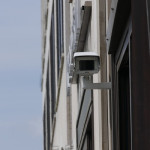Pros & Cons Of Public Security Cameras
There is much debate on whether or not surveillance cameras should be installed in public places such as airports, schools, libraries, and stores. The line between privacy and security is thin and both sides can be argued.
Although so may feel like public surveillance is an invasion of privacy, laws that prohibit surveillance in public places are few and far between, and may be limited to geographical areas. For example, in New York, police may only use video surveillance footage as part of an investigation into the alleged criminals after obtaining a warrant from local authorities.
And remember, placing cameras in areas where an individual has a reasonable expectation of privacy (ex. bathrooms, changing rooms) is always prohibited.
Let’s look at the different pros and cons of public surveillance.
Pro: Increase Public Safety
Just like surveillance on our private property improves our home security, surveillance in public areas increases public safety. Public surveillance can aid in keeping you safe when you are out and about.
Public security cameras can keep an eye out for crimes as well as act as a deterrent. For example, if suspicious individuals are seen in an area, authorities may be able to get ahead of the situation and possibly move innocent bystanders out of harm’s way.
Pro: Reduce Crime Rate
According to statistics, after security cameras are installed, crimes rates drop. For example, crime rates in Humboldt Park dropped 20% after video surveillance was implemented. As previously mentioned, the presence of security cameras act as a deterrent as criminals do not want to risk getting caught on camera.
Pro: Helps Catch Criminals
For crimes committed where video surveillance is present, the chance of catching criminals is much higher. With advanced technology like facial recognition, security cameras may be able to better identify criminals, helping authorities to track them down. Also, these images and information may be shared with the public to help spread the word. It may be difficult to obtain eyewitness accounts, but with security cameras, you often have video evidence of the events that transpired.
Pro: Provide Evidence & Gather Clues
Along the same lines, surveillance footage can be used as evidence in the courtroom. On the other hand, video footage may also help to prove a person’s innocence. Either way, recordings of public areas can help provide clues to solve crimes, and may even provide solid evidence for criminal cases.
Pro: Convenience
Convenience comes in the form of traffic cameras. Surveillance cameras at stoplights help to prevent drivers from speeding through a red light, while security cameras installed on streets and freeways can help to monitor traffic conditions in real-time.
Con: Easily Abused
Unfortunately, this helpful technology can be easily abused. For example, information collected from public cameras can potentially be used as a form of blackmail. Another example is voyeurism and stalking. To combat these issues, strict regulations on public surveillance must be put into place.
Con: Doubts About Effectiveness
In addition, many people doubt the effectiveness of public surveillance. While statistics may show that crimes and incident rates have decreased, security cameras are not as effective when it comes to horrific acts such as terrorism.
Con: Expensive
The cost of public security cameras is another issue. Since many doubt the effectiveness, they feel that public surveillance systems are a waste of money. They argue that high maintenance and costs of these systems is not justified by their limited results.
As you can see, both sides have valid arguments. It is a matter of whether the pros outweigh the cons or vice versa. For the most part, public surveillance has been working for our benefit. Feel free to share your thoughts on the matter with us and your peers on Facebook, Twitter, LinkedIn, and Pinterest.
Please call us at 888-203-6294 if you have any questions regarding our security cameras or installation services, or to request a free quote! You can also visit us online at SecurityCamExpert.com, where you’ll find more information about our products and service. We are happy to help you protect yourself and your loved ones.
Wired Security Cameras Vs. Wireless Security Cameras
Security cameras offer great benefits for various settings. From protecting your business or property to keeping an eye on nursing homes or daycare centers, surveillance camera systems can be incredibly helpful.
The extensive surveillance market is like a double-edged sword. While there is likely a security solution for nearly every need, sorting through the options to find the best security solution for you can be seemingly endless. However, with the proper approach and assistance, you can find a suitable surveillance system in a timely manner.
When shopping for security camera systems, it is best to evaluate your needs and research which solutions may better suit you. For example, choosing between wired or wireless security cameras can be determined by weighing their advantages and disadvantages, while understanding how these can play into your specific requirements.
To help you choose which is better for you, here are some basic pros and cons of both wired and wireless security cameras.
Wired Security Cameras
Pros
- Video is transmitted straight to your recorder with no interference from other wireless devices.
- A wide variety of camera styles are available.
- Wired cameras make it impossible for the signal to be jammed.
- IP-based wired cameras can provide video resolutions at High Definition and beyond, transmitting large amounts of data over CAT5 cabling.
Cons
- Installation involves wiring (and likely conduit), making it a lengthier and more complicated process.
- Changing the location of your cameras requires rewiring, thus providing less flexibility.
Wireless Security Cameras
Pros
- The absence of wiring enables an easier installation process.
- More flexibility in terms of relocating cameras.
- Wireless cameras can connect to your existing Wi-Fi network.
Cons
- Depending on the range of your Wi-Fi network, connectivity issues may arise.
- Picture quality is not as good as wired cameras provide.
- Crowded frequency (due to the overlapping of other wireless networks or channels) can lead to dropped signals, interference, and lost video.
- Frequency issues make these generally less reliable than wired cameras.
- If cameras are used outdoors, signal may be lost during inclement weather.
Other things to consider include the structure of your property or building and the location of power sources. While some may prefer strictly wired solutions, and others choose wireless, it is possible to create a hybrid system, incorporating both wired and wireless cameras. It is best to consider different options before deciding on a security system.
Let us help you create the best security camera system. Browse our stock online at SecurityCamExpert.com or call 888-203-6294 to discuss your options. You can also connect with us on Facebook, Google+, Twitter, LinkedIn, and Pinterest.

